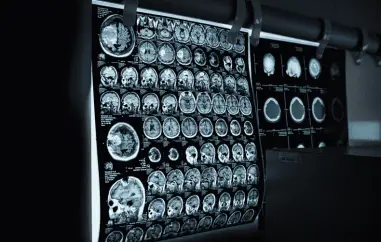Hereditary Form of Alzheimer's Disease Confirmed by Research
 A recent study reveals that individuals possessing a duplicated version of the APOE4 gene in their genetic makeup are nearly always prone to exhibiting symptoms of Alzheimer's disease. Additionally, this hereditary form of the illness tends to manifest several years earlier than non-hereditary cases, as reported by a team of researchers led by Juan Fortea from the Sant Pau Institute in Barcelona, as published in the journal Nature Medicine. The prevalence of this gene combination is relatively high within the population.
A recent study reveals that individuals possessing a duplicated version of the APOE4 gene in their genetic makeup are nearly always prone to exhibiting symptoms of Alzheimer's disease. Additionally, this hereditary form of the illness tends to manifest several years earlier than non-hereditary cases, as reported by a team of researchers led by Juan Fortea from the Sant Pau Institute in Barcelona, as published in the journal Nature Medicine. The prevalence of this gene combination is relatively high within the population.
The APOE4 gene has long been linked to an elevated risk of developing Alzheimer's, states Fortea in a press release from the institute. "However, it is now established that almost all individuals carrying duplicates of this gene exhibit physical traits of Alzheimer's. This is significant given that these individuals represent between two to three percent of the population." German experts praise this research as "convincing work" that contributes significantly to our understanding of the disease.
Alzheimer's, the most common form of dementia affecting over a million people in Germany alone, remains a condition whose exact cause has yet to be fully elucidated. However, the leading suspect is the protein fragment beta-amyloid (AÃ), which forms deposits known as plaques between nerve cells in the brain, triggering a cascade of changes that ultimately result in nerve cell damage and dementia.
APOE4: A Long-Established Risk Factor for Alzheimer's
APOE stands for apolipoprotein E, a protein responsible for delivering essential nutrients to nerve cells in the brain. Humans possess three different variants of this protein: APOE2, APOE3, and APOE4. Each person inherits two genetic predispositions for this protein, which may or may not be the same variant.
The APOE4 variant has long been recognized as a risk factor for Alzheimer's. According to the German Center for Neurodegenerative Diseases (DZNE), studies indicate that APOE4 disrupts nutrient supply to the brain, leading to nerve cell damage. Additionally, APOE4 proteins significantly accelerate the formation of amyloid plaques. It is already known that individuals carrying duplicate APOE4 genes in their genetic makeup are disproportionately affected by Alzheimer's, a condition referred to as APOE4 homozygosity.
Alzheimer's: A Genetic Link Further Explored
The Alzheimer's Research Initiative (AFI) notes that Alzheimer's disease is hereditary in rare cases. Currently, three genes (APP, PSEN1, and PSEN2) are known to contribute to hereditary forms. However, a fourth gene, APOE4, may now join this list. Unlike the aforementioned genes, which require only one copy for a high probability of disease development, individuals must carry two APOE4 genes, or be homozygous, to have a significantly heightened risk of inheriting Alzheimer's.
Investigating the Link Between APOE4 Homozygosity and Alzheimer's
Fortea's team explored the correlation between APOE4 homozygosity and Alzheimer's disease severity. Their analysis incorporated data from several extensive health studies, including information on over 3,000 brain donors, nearly one-tenth of whom carried duplicate APOE4 genes. The researchers also assessed biomarker data and disease progression in over 10,000 individuals, including those with two APOE4 genes.
"The findings revealed that almost all APOE4 homozygous carriers exhibited Alzheimer's pathology and, from the age of 55, displayed significantly higher levels of Alzheimer's biomarkers compared to APOE3 homozygous carriers," write Fortea's team. By age 65, over 95 percent of affected individuals showed high amyloid levels in cerebrospinal fluid, with three out of four patients displaying amyloid deposits in the brain. This suggests that homozygous carriers of the APOE4 gene almost invariably develop Alzheimer's symptoms.
An accompanying commentary in Nature Medicine suggests, "Redefining APOE4 homozygosity as a genetic form of Alzheimer's disease would alter researchers' understanding of the condition and their approach to studying it." This redefinition positions APOE4 as a causative factor in Alzheimer's disease, rather than solely a risk factor, underscoring the urgent need for targeted drug development.
Alfredo RamÃrez, head of the Molecular Neuropsychiatry Section at the University Hospital of Cologne, expresses confidence in the results: "There is little doubt left regarding considering APOE4 as a monogenic form of Alzheimer's disease." However, accurate determination of the likelihood of homozygous carriers developing Alzheimer's disease remains necessary.
Nicolai Franzmeier, researching Alzheimer's disease development at Ludwig Maximilians University in Munich, comments, "Nevertheless, the study's impact on clinical diagnostics in routine practice, at least in Germany, is practically non-existent at present." Currently, APOE4 diagnostics are not routinely recommended in clinical practice due to the lack of therapeutic interventions, although this may change in the future. Franzmeier notes that a new antibody therapy soon to be approved in the EU may have more pronounced side effects in APOE4 carriers than in carriers of other APOE variants.
Image by Dmitriy Gutarev from Pixabay
Â










































